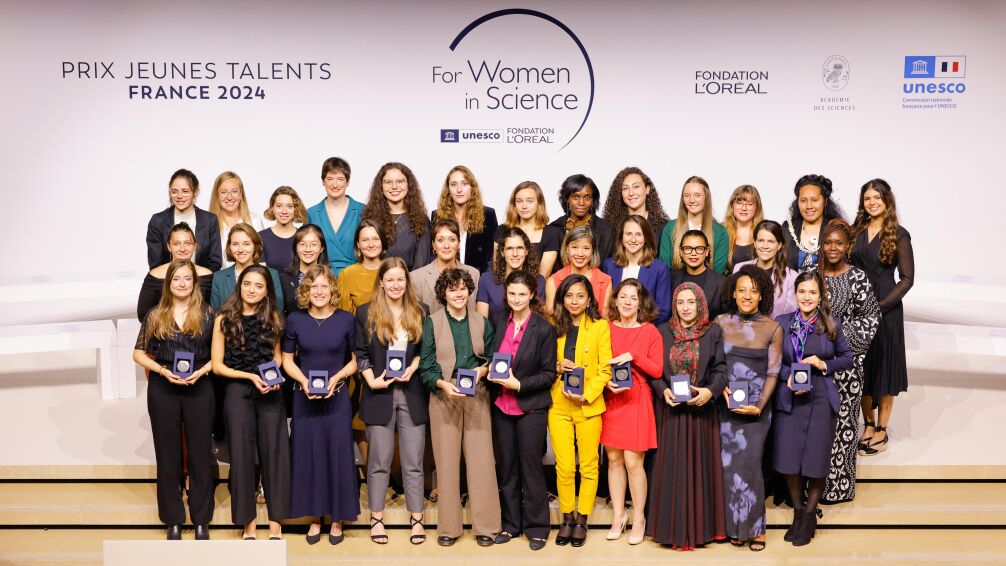 ニュース
ニュース 
L'Oréal-Unesco Young Talent Prize 2024 for Women in Science: ten alumnae rewarded
On 9 October, 35 young women researchers received an endowment as reward for the excellence of their work during the 18th L'Oréal-Unesco Young Talent Prize 2024 for Women in Science. With this prize, Fondation L’Oréal honours women’s talents in various disciplines, contributing to gender equality in sciences. The 35 laureates include ten French alumae [1].
With the aim to “promote promising young women researchers and boose their career”, Fondation L’Oréal, in collaboration with the Academy of Sciences and the French National Commission for UNESCO has released in early October, for the 18th consecutive year, the name of 35 women doctoral and post-doctoral students who were rewarded the L’Oréal-Unesco Young Talent Prize 2024 for Women in Science.
Women are still underrepresented among researchers
“Women are still largely underrepresented in scientific doctorates. This reality hides many discrepancies, and the gap is even wider in specific study courses, such as mathematics or physics, including because of deeply rooted stereotypes”, declared the president of the Academy of Sciences and president of Young Talents Prize jury. According to the French ministry in charge of higher education, figures show that women still only account for 43% of students in university scientific study courses. Indeed, despite significant progress over the last years, women only account for 29% of researchers in France, versus 31.7% at global level.
To face this challenge and “break the glass ceiling and inspire younger generations”, Fondation L’Oréal created the L'Oréal-Unesco Young Talent Prize 2024 for Women in Science. The jury of the prize, made of 40 members from the Academy of Sciences, has reviewed this year 771 applications from young researchers (537 doctoral students and 234 post-doctoral students) who managed to “show outstanding expertise in various public research entities”.
Ten alumnae out of 35 laureates
The 35 laureates “embody French scientific excellence and contribute through their research to shed the light with new knowledge on a more just and sustainable future”. Ten are alumnae who attended part of their training or currently attend their doctoral or post-doctoral studies in France. Several groups divide laureates in scientific specialities:
In the “Analyse, anticipate and predict” category:
- Jehanne Aghzadi, a doctoral students who, after studies in neurosciences that flew her from Morocco to the Untied States, is now studying a doctorate in the Institute of Neurophysiopathology from the University of Aix-Marseille;
- Xiaowen Chen: a post-doctorate student of Chinese origin born in Shanghai who is studying “social behaviours which are critical to understanding human and animal groups” in a post-doctoral course in the Laboratoire de Physique of the École Normale Supérieure in Paris.
- Kindness Isukwem, a doctoral student of Nigerian origin who continued her academic course in France in a doctorate course in fluids mechanic in the Centre de mise en forme des matériaux, at École des Mines in Paris.
In the “Biodiversity, ecology and climate change” category:
- Paula A. Gomes, a doctoral student of Brazilian origin who registed in one of the best public universities in Brazil before continuing her studies in France with a scholarship grant. She is now in thesis at SCPI Paris - PSL and specialised in “understanding interactions of microalgae with their environment”;
- Alicia L. Bruzos, a doctoral student of Spanish origin specliasing in cancer studies who received a scholarship after her first post-doctoral contract in the UK, and is now completing a doctorate in France at the Unviersity of Caen;
- Gabriela Caballero-Vidal, a post-doctoral student of Paraguayan origin with a very international career (France, Australia, Sweden) who dedicated her thesis and post-doctorates to “interactions between insects and their environment” and is now in post-doctorate at the Institut d’Écologie et des Sciences de l’Environnement de Paris (Sorbonne University).
In the “Genetic mutations, cancers and immunity” category:
- Sheryl Bui, an English post-doctoral student with a doctorate in cellular and molecular biology, who has embarked on “an original and unusual career in France: doctor-researcher” in a laboratory at the Université Paris Cité - CNRS - Inserm;
- Oportune Kpotor, a doctoral student from Togo, where she did her initial university studies before moving to Toulouse III - Paul Sabatier University, where she is now doing a doctorate at the Institute of Metabolic and Cardiovascular Diseases, on “a rare and little-studied disease, centronuclear myopathy”;
- Muzhda Haem Rahimi, a doctoral student born in Kabul, who, alongside her career as a teacher of immunology and microbiology in Afghanistan, has spent time in France, where she has built up her knowledge of immunology. Having been forced to leave her country, she is now pursuing a doctorate in France, in the immunology laboratory at the Édouard Herriot Hospital (Lyon);
- Melissa Saichi, a doctoral student from Algeria who arrived in France at the age of 18 and was awarded her first excellence scholarship, followed by a second to begin a doctorate in bioinformatics and systems biology (Institut Curie).
A valuable network
The Fondation explains that thanks to this prize the 35 Young Talents “join the largest community of women scientists in the world”, made up of more than 4,400 female researchers from over 140 countries. This community is “an invaluable network for fostering scientific collaboration, providing inspiration and support in the face of obstacles”.
By awarding them a significant endowment (€15,000 for doctoral students and €20,000 for post-doctoral students) and supporting them with a leadership training programme, the L’Oréal Foundation and its partners are reaffirming their unwavering commitment to the future of science and the place of women within these disciplines.
[1] In English, it is now common to use “alumnae” (former women students) to feminise “alumni” (former students). We have chosen to use this form.
Explore more:
- The Fondation L'Oréal website
- The Academy of Sciences website



Commentaires
Vous devez être connecté pour laisser un commentaire. Connectez-vous.